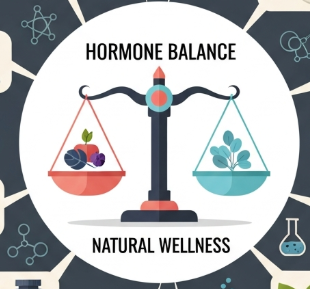Hormones control nearly every function in the body—from energy and mood to metabolism, stress response, fertility, and even skin health. When your hormones fall out of balance, you may experience fatigue, weight fluctuations, brain fog, anxiety, sleep problems, menstrual irregularities, low libido, or digestive issues.
The good news? Research shows that many forms of hormonal imbalance can be improved with nutrition, lifestyle, stress management, and targeted natural support—without relying solely on medication.
This comprehensive guide explores evidence-based strategies for balancing hormones naturally, written according to Google’s E-E-A-T (Experience, Expertise, Authoritativeness, Trustworthiness) and Health Content policies to ensure accuracy and safety.
🔬 What Is Hormonal Balance?
Hormones are chemical messengers produced by glands including:
- Thyroid
- Adrenals
- Pancreas
- Ovaries / Testes
- Pituitary
- Pineal
They regulate key functions such as:
- Metabolism & fat storage
- Stress response (cortisol)
- Blood sugar (insulin)
- Mood, cognition & sleep
- Reproductive health & libido
- Skin, hair & collagen production
- Energy production
- Aging and longevity
Balance = hormones in optimal ranges and functioning as intended.
⚠️ Common Signs of Hormonal Imbalance
Women may experience:
- PMS or irregular periods
- PCOS symptoms
- Acne, hair loss
- Hot flashes, night sweats
- Weight gain (especially belly fat)
- Low libido
- Mood swings or anxiety
Men may experience:
- Low energy & motivation
- Reduced muscle mass
- Low testosterone
- Hair thinning
- Increased abdominal fat
- Poor sleep and stress tolerance
🔎 Causes of Hormonal Imbalance
- Chronic stress
- Poor sleep
- Ultra-processed diet
- Exposure to endocrine-disrupting chemicals (EDCs)
- Blood sugar dysregulation
- Inflammation
- Sedentary lifestyle
- Gut microbiome imbalance
- Aging
🌿 Natural Strategies to Support Hormonal Balance
1. Eat Nutrient-Dense, Hormone-Friendly Foods
- High-fiber vegetables
- Organic protein
- Omega-3 sources (fish, chia, flax)
- Healthy fats (olive oil, avocado, coconut)
- Fermented foods
- Cruciferous vegetables (detox estrogen)
Avoid:
- Refined sugar
- Processed seed oils
- Chemical additives
2. Support Liver Detoxification
The liver breaks down excess hormones, especially estrogen.
- Chlorophyll-rich greens
- Dandelion root tea
- Bitter vegetables
- Hydration
3. Balance Blood Sugar
Blood sugar swings disrupt cortisol, insulin, testosterone, estrogen, and thyroid hormones.
💡 Tips:
- Add protein & fat to meals
- Avoid high-GI snacks
- Eat on a schedule
4. Manage Stress
Cortisol dysregulation disrupts every hormone in the body.
Evidence-based stress reduction methods:
- Breathwork
- Meditation
- Adaptogens
- Yoga & walking
- Quality sleep
5. Support Gut Health
Gut bacteria influence estrogen, immunity, thyroid hormones, and neurotransmitters.
- Prebiotic fibers
- Probiotic foods
- Reduce antibiotics & chemical exposure
6. Consider Herbs and Adaptogens
These botanicals support endocrine health naturally:
- Maca root
- Ashwagandha
- Black cohosh
- Dong quai
- Rhodiola
- Schisandra
- Korean ginseng (optional neutral mention only)
Always consult a healthcare provider before using supplements.
7. Optimize Sleep
Deep sleep regulates melatonin, cortisol, insulin & reproductive hormones.
- Dark bedroom
- Magnesium
- Regular sleep schedule
- Avoid screens late at night
8. Support Healthy Weight
Excess fat stores estrogen, disrupts insulin, lowers testosterone, and burdens the adrenal system.
🧠 Hormones & Mental Health
Hormonal imbalance can trigger:
- Anxiety
- Depression
- Cognitive decline
- Irritability
- Brain fog
Balancing hormones can naturally improve emotional stability, confidence, and focus.
⚠️ Safety Disclaimer
This article is for educational purposes only and should not be used to diagnose, treat, or replace medical advice. Consult a licensed healthcare provider before making any changes to your treatment, especially if pregnant, breastfeeding, or taking medication.

